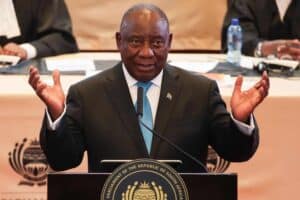Mkhwanazi claims, if true point to a new wave of state capture threatening President Ramaphosa’s leadership

In a week when SA’s attention was on foreign threats – swingeing US tariffs and a stumbling Brics summit – the menace turned out to be locally manufactured.
In KwaZulu-Natal, to be precise, a province with a long history of putting a spoke in the national wheel.
A charismatic young police general, dramatically flanked by heavily armed bodyguards, held a surprise press conference where he made explosive allegations of political interference and criminal collusion at the highest levels of the law enforcement and justice systems.
Ramaphosa’s leadership under siege
This is a crisis that could kneecap President Cyril Ramaphosa’s administration in much the same way that state capture abruptly ended Jacob Zuma’s presidency.
If the allegations are true, they would expose the past six years of Ramaphosa’s presidency to have been a hollow sham.
Not only has the ANC government failed to bring to book any of the ministers and high-ranking officials identified by the Zondo commission, it appears to have allowed the corruption to continue and spread.
If true, the revelations would collapse the already eroded moral authority of the police (Saps) and the National Prosecuting Authority (NPA), as well as further tarnish the judiciary.
The criminal justice system would have to be revamped from top to bottom.
All key posts are filled by deployed ANC cadres. It is simply inconceivable that the crooked appointees will allow themselves to be ousted.
The claims made by Lieutenant-General Nhlanhla Mkhwanazi, the KZN police commissioner, detail a society effectively controlled by a criminal collective under the protection of the Police Minister Senzo Mchunu and some of the Saps top brass.
ALSO READ: Charges laid against Mchunu as pressure mounts on Ramaphosa to act amid national security concerns
A more dangerous second wave
If true, the scale of infiltration alleged here – let’s call it what it is, State Capture 2.0– would be a significant growth in malignancy when compared to its Zuma-era predecessor.
The cancer would have metastasised. No longer confined to looting state-owned enterprises, but now burrowed deeply into the state’s security apparatus, with all the implications for criminal impunity and national instability.
Ramaphosa has described the situation as a “grave national security threat” but, as is his custom, his words are ambiguous.
Does he fear Mkhwanazi’s whistle-blowing or the prospect of the justice system’s total compromise?
ANC secretary-general Fikile Mbalula, too, seems to think stalling tactics are the solution, saying the matter will be referred to the party’s oxymoronic integrity commission.
ALSO READ: Senzo Mchunu investigation will take longer to finalise, says Public Protector
Public rallies behind whistleblower
But this time, the ANC may be misreading the national mood, which is distinctly supportive of Mkhwanazi.
There have been spontaneous protests outside police stations and social media solidarity, warning against state retribution towards Mkhwanazi.
A range of parties have hailed Mkhwanazi as courageous and called for Mchunu’s suspension.
Particularly significant was the reaction of national commissioner Fannie Masemola, whose own deputy was implicated by Mkhwanazi.
Masemola has made clear it was not he who ordered the task team’s disbandment and told a press conference that unless Ramaphosa decreed otherwise, Mkhwanazi would face no disciplinary action and that security around the whistle-blowing general had been strengthened, in response to threats on his life.
At home and abroad, the ANC-led administration faces the fiercest headwinds of the democratic era.
Navigating them will require political courage, but Ramaphosa’s preferred strategy – hunkering down and avoiding action for fear of mutiny – is not just the wrong strategy; it’s the very reason for the crisis.
NOW READ: Is Police Minister Senzo Mchunu about to be booted out?
Support Local Journalism
Add The Citizen as a Preferred Source on Google and follow us on Google News to see more of our trusted reporting in Google News and Top Stories.






